Is anonymous social networking a flash-in-the-pan trend? A winner-take-all category? Which of the anonymous social networking apps around today are still thriving, and which are practically dead?
These questions come to mind today as one of the leading companies in the “anonymous social” category, Secret, revamped its application, borrowing ideas from popular apps like Yik Yak and Snapchat and others in order to introduce new features like location-based posts and disappearing private messages.
Secret’s pivot is representative of the app’s inability to maintain growth amid an overall decline in anonymous social networking applications, with the exceptions of Yik Yak, Whisper and, more recently, newcomer After School.
Anonymous Networking and Its Dangers
For a bit of background before diving in: One of the bigger trends among consumer applications in 2014 was the rise of “anonymous social networking” – or apps that allowed users to post publicly to networks without using their real names. Users on these apps share secrets, gossip and other random thoughts.
They are different from private messaging apps because their content is visible to anyone who logs in, or anyone in a given geographical region. That is, they’re “one-to-many” sharing apps, not “one-to-one” mobile messengers.
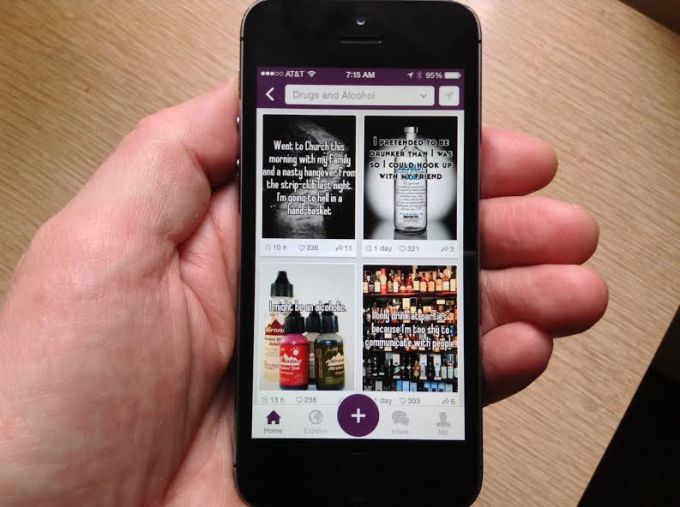
Investors and the media alike debated about the ethics of these sorts of apps, as they often allow for cyberbullying and shaming of public figures – and in some cases, even seemed to encourage that activity.
Nevertheless, “anonymous social” seemed to be carving out a new category for itself this year.
It almost made sense that this sort of activity would emerge in a post-Snowden society where users realized that social networking on more public, “real-name” networks like Facebook had been tracked by their own government.
Perhaps “anonymous social” would encourage the same sort of human connection that Facebook once offered, without the drawback of disclosing your true identity along the way?
Actually, what anonymous social networking for the most part offered was yet another reminder that when people no longer have to stand behind their words, they can say some pretty terrible things. Ever since the days of Myspace, which had the dubious honor of being the first to bring about a cyberbullying verdict in U.S. courts, social networking users have had to contend with online bullying issues.
Anonymous features in Ask.fm, for example, were referenced as being directly contributing to a good handful of teen suicides, and following its revamp toward more “safe” networking policies, newcomer Yik Yak appeared to be ready to pick up the slack as one of the top mobile-first anonymous networks.
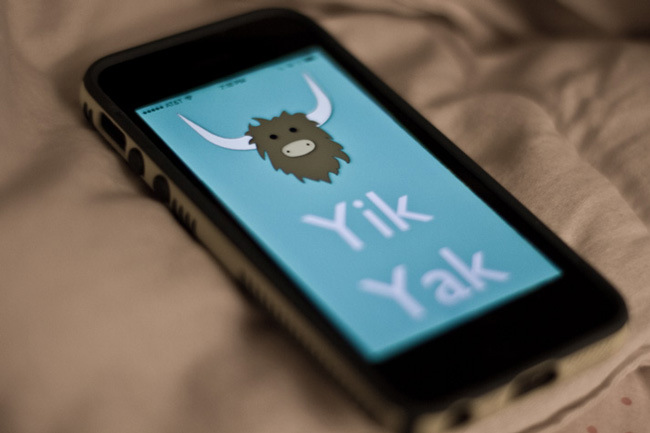
On Yik Yak, which combines anonymity with location-based networking, cyberbullying became so bad this year that the company had to implement technology to block the app on school grounds around the U.S.
School officials warned parents about the dangers of the app, which had become home to threats, including bomb threats and shootings, and vicious bullying. A girl on Yik Yak was even reportedly bullied for getting raped, a news report once said.
Twitter, though not entirely anonymous as many users identify themselves by name, is navigating this same challenge today with respect to handling bullying and threats.
Anonymous Networking Winners and Losers
Sadly, in private, people do want to read about shameful secrets, gossip, and other things that people think, but are too polite to say publicly. When any network caters to this sort of activity, it soars.
Secret’s ascension in the App Store earlier this year is attributable to the fact that it became a go-to destination for tech industry gossip and leaks. When Secret, funded to the tune of $35 million from investors/users, finally had to clamp down on that activity – by recognizing and flagging posts where users were typing in people’s real names and stopping users from posting photos from their camera roll, among other things – it began to decline.
In short: when the trash talk dropped, so did the app’s popularity.
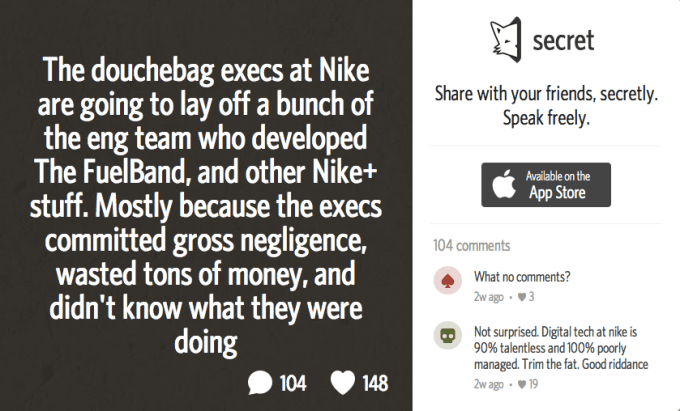
And thus demonstrates the vicious cycle for anonymous apps. Let people misbehave, and the app buzzes with activity. Sanitize the experience to protect people’s feelings (and potentially users’ lives), and the app fails.
Ask.fm is a great example of what “cleaning up” looks like (via App Annie). It declined from the top of the App Store down to #444 after its acquisition this year, which saw it agreeing to work with regulators to implement cyberbullying protections:
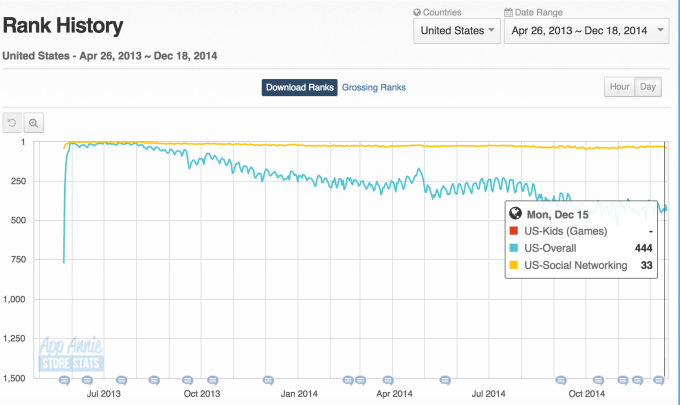
Losers
While Secret, Yik Yak, Whisper and others reigned this year, a number of others entered the “anonymous social” space this year as well. Few of these still matter.
For instance, a representative sample from the long-tail (data via App Annie):
- TenTwenty, a Yik Yak-like app: dead, buried, and pulled from the App Store.
- Shortwave Messaging, like Secret + FireChat: no longer ranked – meaning it’s ranked lower than #1,500
- WUT, anonymous networking via push notifications: no longer ranked
- Cloaq, anonymous networking: no longer ranked
Winners
And among those who could still be contenders?
They include: Yik Yak, Secret, Whisper, Facebook’s Rooms (if not by traction, but by its parent company’s power to promote it if it chose to), and newly popular entrant After School. To be fair, After School is likely only popular because it had virtually no content protections in place against, and younger users gravitate towards this “wild west” type of sharing experience.
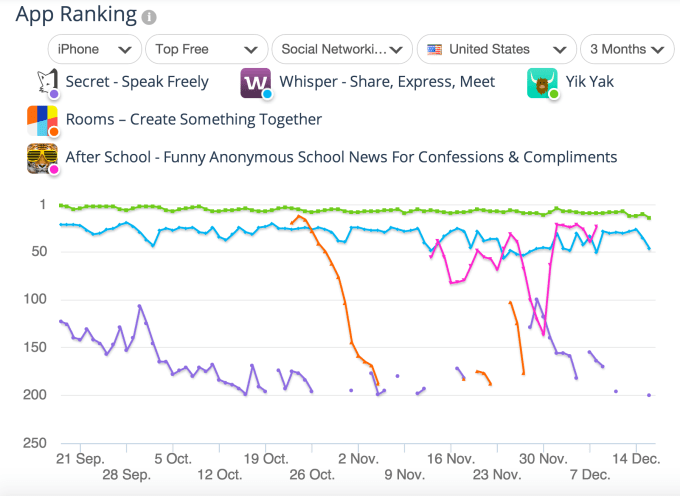
On the chart above, current as of Tuesday, only Yik Yak and Whisper have any significant traction at this time. (After School has been again pulled from the App Store at the time of publication.) (Data for iOS versions, U.S., via SimilarWeb).
Historical rankings:


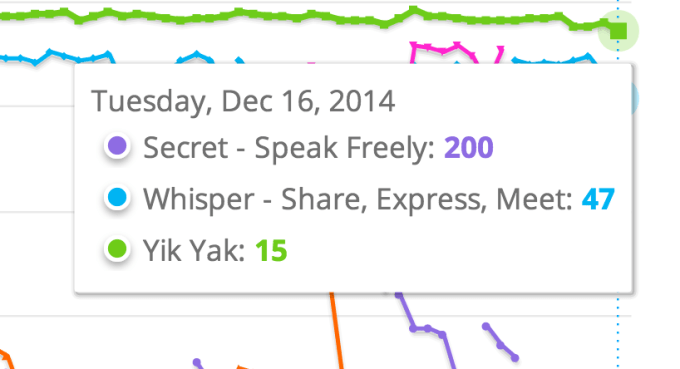
Yik Yak flits in and out of the top 10 and 20, Whisper the top 50. After School briefly soared, but also has to deal with being pulled from iTunes. For cyberbullying!, go figure.
Today’s U.S. rankings for these apps in the Social Networking category on iTunes are as follows:
- Yik Yak: #20
- Whisper: #62
- Secret: #199
- After School: Pulled from the App Store! Again!
- Facebook’s Rooms: #277
One could argue that FireChat (#161 Social Networking) also deserves to be in this category, but its purpose is a bit different – it’s more about connecting people when an internet connection or phone coverage is not available, rather than being solely focused on anonymity. It has proven popular at outdoor festivals and protests.
What Secret’s Decline Looks Like
When apps like Secret drop in the rankings after cleaning up their experience, they tend to lose their active users as well.
For some insight into this: using data from SimilarWeb’s (beta) service which currently tracks actives on Google Play apps only, you can see Secret’s monthly actives falling over time.
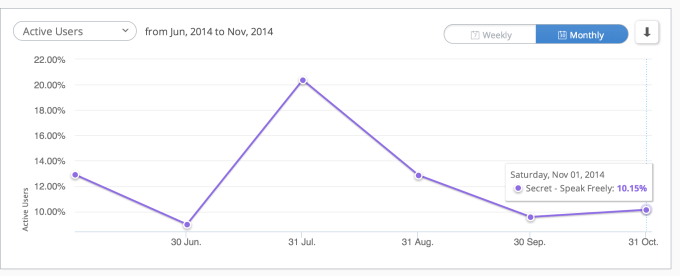
Vs Yik Yak and Whisper:
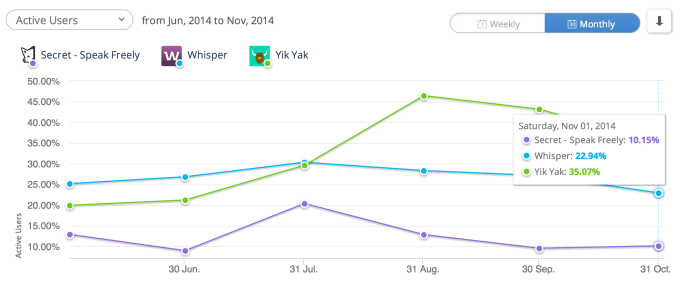
The question for Yik Yak and Whisper, as the only real contenders left given After School’s inability to keep its app in the App Store, is how long they can last.
Whisper is arguably maintaining its popularity today because it has veered into “adult” territory thanks to its “NSFW” category and other sexual content. Yik Yak, meanwhile, may have geo-fenced its app, but kids, teens and other young adults are still using it for cyberbullying as many recent news stories indicate.
If either of these apps clean up their content or cut down on the gossip and sex, their heydays could be over as well – just like Secret, Ask.fm, MySpace, and all the others where cyberbullying once thrived, then died.
